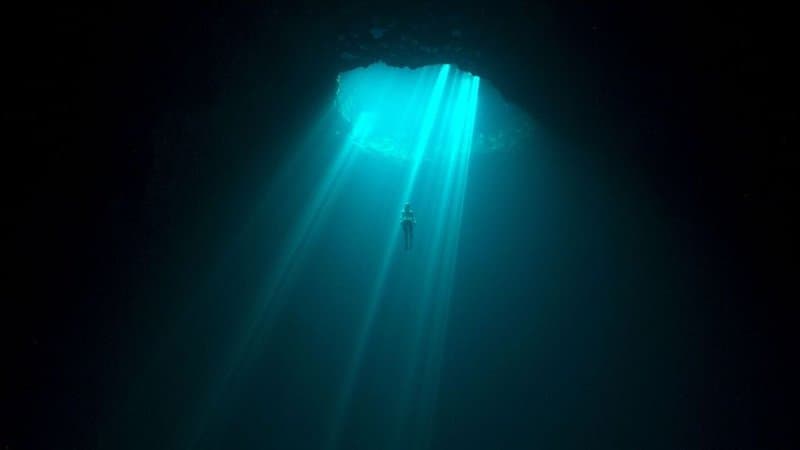This article is part of our 2023 Sundance Film Festival coverage. Follow along as we check out the films and filmmakers appearing at the first fest of the new year. In this entry, Farah Cheded reviews Laura McGann’s The Deepest Breath.
The question nagging at the edges of every extreme sports documentary is a simple one. Why? What exactly do these athletes get out of their death-defying stunts that makes the risks they take worth it? Set in the world of freedivers — athletes who dive as deep as they can on only a single breath — Laura McGann’s The Deepest Breath offers an unexpected answer to that question in its very first minutes.
The film opens on land, with a brief clip of Italian champion Alessia Zecchini telling an interviewer that she’s neither scared of nor thinks much about death. Then, the film plunges with Alessia into her watery domain. We watch as she glides balletically downward toward the bottom of the Atlantic Ocean. Though she is sustained by just two lungfuls of oxygen, there is no sign of stress or effort in her movements as instead they’re graceful, serene, and natural.
The footage — real, shot as part of official proceedings for Vertical Blue, an elite free-diving competition — is set to the steadily slowing thump of a heartbeat. Together, the tranquillity of these hypnotic sounds and images attune us to the wavelength of free-divers like Alessia, wordlessly demonstrating why they stretch the limits they do. There’s a special peace to be found down there, in the blue abyss that Alessia calls “the last quiet place on Earth,” and by holding your breath “you get to understand a lot more about yourself.”
It’s a fascinating subversion of our expectations that these extreme athletes might, in fact, be anti-adrenaline junkies, seeking quiet transcendence rather than splashy thrills. But instead of trusting that audiences might be drawn into the deep of its story by the same pursuit, The Deepest Breath believes the opposite — that it must manufacture a histrionic sense of foreboding to keep us watching.
We know that tragedy is on the horizon from the ominous mention of death in the film’s opening scene, and we soon see how close Alessia comes to paying that stark price for her pursuit of ultimate solitude. When she finally breaks the surface after that first serene dive, the elegance of her movements underwater abruptly contorts into panic. Her limbs flail, her mouth spits frantically, her eyes roll toward the sky. A safety diver grabs her spasming head and plants his lips on hers to deliver a kiss of life.
The Deepest Breath freezes on this moment, shrewdly playing on the physical intimacy required by that life-saving act to hint at what is to come between Alessia and the other diver, Stephen. We spend the next hour or so following the paths that lead them independently to that climactic moment in the ocean together. Stephen, an Irish adventure-seeker, found his way into freediving via gorilla treks in Congo and detours in the desert, while Alessia, a former child prodigy in the sport, always knew she was destined for it. Both journeys are compelling in their own right.
It’s thrilling and inspiring to follow a pre-teen Alessia over the hurdles posed by her gender and age, and there is much to be moved by in Stephen’s own pursuit of purpose. But these insights into what pulls people into the deep are frequently dulled by The Deepest Breath’s narrative insecurity. The film often defaults to an ominous framing, making constant, brooding cuts to talking heads who remind us of the probability of freak accidents and the price of insatiable ambition. These alarm bells are further amplified by the onscreen absence of Alessia or Stephen for much of the film — a conceit that rings a little manipulative by the time the credits roll.
Because we’re never allowed to bask untroubled in the wondrous aspects of the story for long, The Deepest Breath struggles to match the revelatory depths of its first moments. There are some glints of transcendence, though. When a bereaved father speaks of being much consoled in his grief by the way his child lived their life, it’s impossible not to be struck by how selfless and buoyant his perspective is. And when Alessia, afraid of the dark, speaks of being soothed by the awareness of Stephen’s presence in the murky depths with her, the film opens up, allowing us to feel some of the supernatural power of their bond.
There are similar pearls to be found in Tim Cragg’s cinematography, too. Largely composed of archival competition footage and vlogs shot by the divers themselves, The Deepest Breath also features some original visual material. Alongside flashy Nat Geo-style images, one hypnotic reconstruction of a dive underscores the spiritual pull the ocean has for these athletes. In this scene, the camera follows a diver down before rotating 180 degrees to make it look like they’re floating upwards, as if they’re soaring up in holy rapture. Julian Hart’s edits can be just as wordlessly eloquent, too. When the screen freezes on Stephen’s kiss of life in the film’s intro, for example, it isn’t just a signal for the romance to come. It also hints at something loftier even than true love, and affirms the film’s simmering theme — that there is nothing so intimate as saving another person’s life.
While its power is often dampened by narrative insecurity, The Deepest Breath manages to stay afloat thanks to these soaring moments and the emotion inherent to its story. Although it holds its breath too much to let it get very far out of the shallows, the story at its heart is undeniably compelling, and so the film manages to pull off the same sleight of hand freediving does: luring us in with the promise of high-octane thrills, but ultimately leaving an impact deeper than a quick spike of adrenaline.

